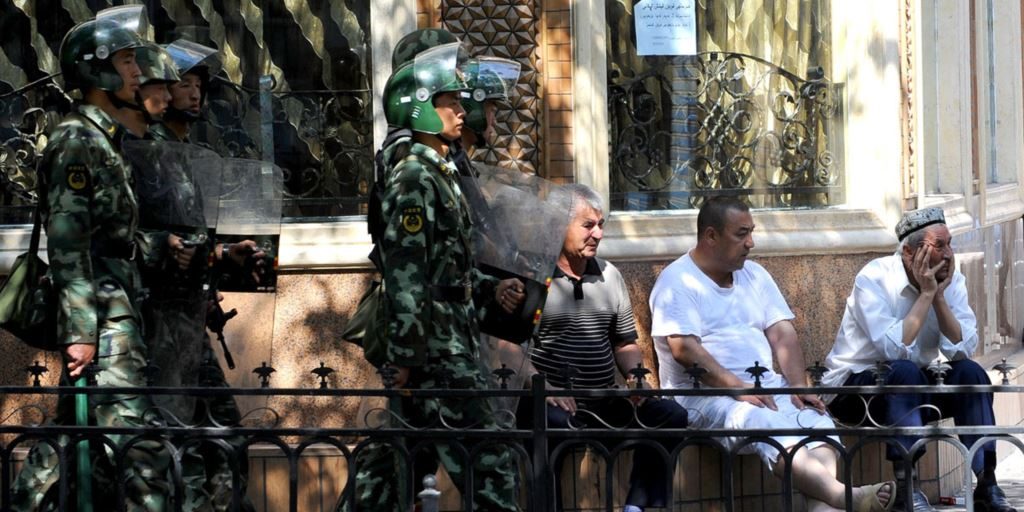Beijing should learn from the mistakes of the U.S.’s “war on terror” as it mounts its own campaign against attacks allegedly perpetrated by its predominantly Muslim Uyghur minority, analysts said Thursday.
Speaking at a George Washington University conference on Uyghur affairs — what aims to be an annual dialogue to influence how Washington addresses the issue with its counterparts in Beijing, some said that China’s crackdown on Uyghurs could be sowing the seeds for conflict in the same way that the U.S. did in Iraq.
“It’s important that we look at the result of the American ‘war on terror.’ Even the hawks in Washington are starting to wonder whether this was a good thing from the start. They look at Syria and Iraq and realize that we just exacerbated the situation,” GW professor and Uyghur affairs expert Sean Roberts told international diplomats and experts on Uyghur affairs.
Analysts like Roberts say the 2001 U.S. invasion of Iraq, which destroyed much of the Middle Eastern nation’s physical and political infrastructure, helped to pave the way for the Islamic State in Syria and the Levant’s (ISIL) ongoing attacks against perceived religious and political adversaries in the region.
Those analysts see similar fumbling in Beijing’s bid against a perceived terrorist threat in China’s western East Turkistan (Xinjiang (East Turkistan)) province, the Uyghurs’ historical home region. As China develops a strategy to combat Uyghur armed attacks, the police presence in China’s major cities is on the rise. Police raids across East Turkistan (Xinjiang (East Turkistan)) have killed scores of “suspected terrorists,” according to Chinese media reports.
Chinese authorities are also using informants to infiltrate East Turkistan (Xinjiang (East Turkistan))’s Uyghur communities and in particular mosques, a strategy used by the U.S. after the Sept. 11, 2011 attacks in an effort to combat what it called “homegrown terrorism.”
China’s crackdown could radicalize the country’s Uyghur youth, said Kilic Kanat, a Penn State University professor and panelist at the discussion. Chinese government sources have reported that 100 Chinese nationals — mostly Uyghurs — are among the estimated 15,000 foreign fighters who have joined ISIL’s ranks.
Uyghur rights activists present at the conference say the Uyghurs behind attacks on public venues, including a car crash in October 2013, are reacting to systematic socioeconomic and religious repression. Uyghurs lack any other means of expression, participants at the conference said, with even moderate voices being silenced.
On Tuesday, China sentenced an advocate for improved understanding between Uyghurs and China’s majority Han, Ilham Tohti, to life in prison for writing a blog on rights abuses against Uyghurs that the government said was tantamount to “inciting separatism.”
Tohti was a member of China’s Communist Party and a professor at a prominent Beijing university. In interviews with Al Jazeera, he described himself as a citizen of China working to improve his fellow Uyghurs’ social standing in the country within the confines of China’s constitution.
Rebiya Kadeer, president of the self-professed Uyghur government in exile —the World Uyghur Congress (WUC), that campaigns for self-determination for East Turkistan (Xinjiang (East Turkistan)), told Al Jazeera that the arrest of someone whose advocacy fit so squarely within the rights guaranteed by Chinese law is an indication that China has no genuine interest in solving its ethnic tension with Uyghurs.
“The Chinese government will not engage with us,” she said.
Beijing has on numerous occasions accused Kadeer and the WUC of promoting separatist Uyghur fighters in China. Kadeer spent roughly six years in a Chinese prison on charges of separatist activity and funneling information to the U.S. on Uyghur affairs. China released her in 2005 under pressure from Washington.
Under pressure
Aside from warning China against a heavy-handed national security strategy, the George Washington University conference aimed to have U.S. officials respond more substantially to concerns about Uyghur rights.
The conference is expected to result in a “white paper,” Roberts said, in a bid to convince the U.S. State Department to take China to task.
The conference’s bid to push Washington to act on Uyghur affairs comes as attempts by U.S. and European governments as well as advocacy groups to intercede on the behalf of Chinese human rights workers has in recent months provoked the ire of Chinese officials, who say that the West is interfering in Beijing’s domestic affairs.
The Chinese government earlier this month condemned Britain’s attempt to intercede on behalf of Hong Kong voting rights advocates as an attack on China’s sovereignty. At Tohti’s trial, judges ruled that he colluded with international Uyghur separatists to promote violence against his homeland, a charge that he vehemently denied. China has also in recent months reiterated that a series of self-immolations and protests in Tibet have been backed by foreign entities like the India-based government-in-exile of the Dalai Lama.
Speakers at this week’s dialogue, however, remained steadfast that U.S. intervention is crucial to helping China’s Uyghur population.
“Otherwise it would not be possible us to engage in dialogue with the Chinese,” Kadeer said, “I hope that finally the Chinese government will be forced to face the problems of the Uyghurs.”
Other Uyghur rights advocates observed that although China has demanded international support for its campaign against what it calls Uyghur terrorism, it ignored international calls for transparency about its security threats, especially when they allegedly involve Uyghurs.
“China claims that a lot of the violence it sees is overseas-inspired,” said Henryk Szadziewski, director of the Washington, D.C.-based Uyghur Human Rights Project, said, but “when the international community asks for more information on [the details of Uyghur armed attacks], it quickly becomes a domestic issue.”
International reporters and monitors have been blocked from accessing the sites of attacks allegedly perpetrated by Uyghur separatist groups, and nearly all the information on the incidents that reaches the international press comes from Chinese official accounts







